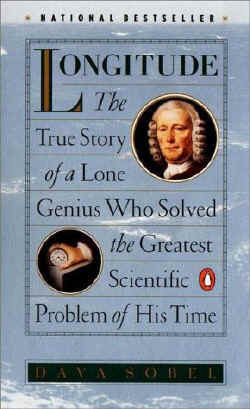Search this Site







Editor: Kris Cerone
The Prize Never Won
A Book Review
By Craig E. Ward
The use of prizes to promote space development comes up frequently. Much is made of how prizes for cutting edge aerial feats aided in the development of aeronautics in the opening decades of the 20th century. It is the 18th century, however, that has the grander and perhaps more relevant example of the use of prizes to solve problems.
 |
| Sobel, Dava. Longitude: The True Story of a Lone Genius Who Solved the Greatest Scientific Problem of His Time. Penguin Books. 1996. ISBN 0-14-025879-5 |
In the book Longitude, author Dava Sobel recounts the story of how the British government used a prize to encourage the quest to solve the greatest scientific and commercial problem of the 18th century - how to determine one's longitude on the high seas.
The problem was significant. Ships that could not determine their longitude could not where they were with any degree of certainty. Destinations could be missed. Storms could smash a ship on an unexpected coast. Whole fleets were in fact lost. With both commercial and military fleets in dire straights over the issue, Parliament passed the Longitude Act of 1714.
The act promised a prize of £20,000 to anyone who could solve the problem and created a panel of distinguished scientists, officers, and government officials, the Board of Longitude, to monitor and adjudicate the distribution of the prize and to give incentive grants to promising inventors. Men of such renown as Sir Isaac Newton served at one time or another over the life of the Board.
The man who finally solved the problem with the solution we still use today was a self-educated clock maker named John Harrison. He undertook what can only be described as an intense engineering research project to find the right kind of materials that would allow a clock to maintain a consistent time regardless of the roll of the sea and changes in temperature and humidity. He built clocks made of parts that expanded and contracted in counterbalance to each other and took them on several sea trials with the Royal Navy.
A not invented here syndrome took hold of the Board of Longitude. The elite mathematicians and astronomers of the Board did not appreciate that a common tradesman had found a better solution than theirs, one based on complicated astronomical observations and calculations. The Board resisted granting the prize to Mr. Harrison. This disagreement continued for years until it reached the ears of King George III. When the King learned of the controversy, he convinced Parliament to grant Harrison a special pension equivalent to the award in 1773.
In the end, the Board of Longitude never officially awarded the prize. By the time it was decommissioned in 1828, it had disbursed over £100,000.
The story is a telling of marvelous engineering and human relations. Sobel tells it with the skill of a novelist and the discipline of an historian. It is a good read and any interested in how prizes can be used to promote space will benefit from it.
Copyright © 1998-2003 Organization for the Advancement of Space Industrialization and Settlement. All Rights Reserved.